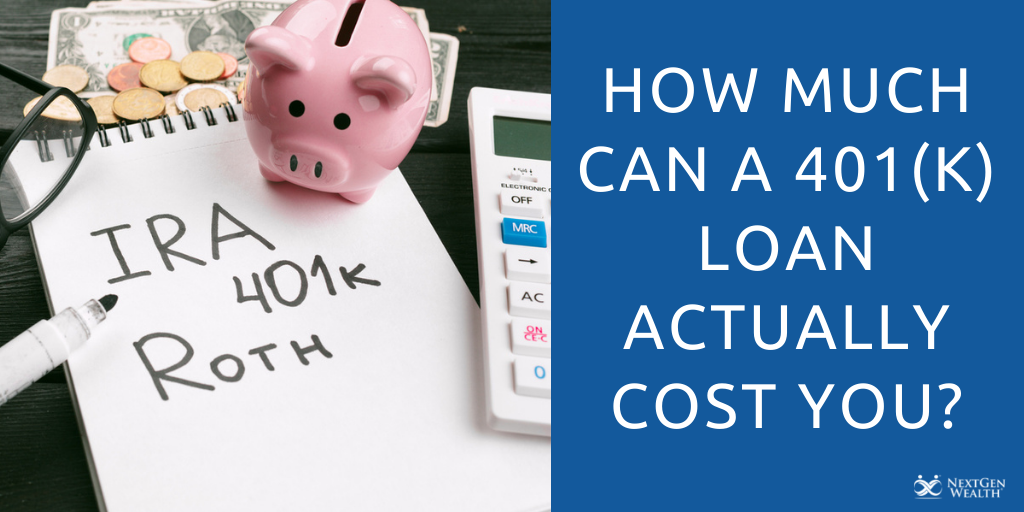How Much Can a 401(k) Loan Actually Cost You?
Only 32% of Americans are investing in 401(k) plans. Even though 59% of American companies offer these plans to their employees, many U.S. citizens opt out of one. If you work for a company that offers a 401(k), it is in your best interest to sign-up, especially if you want to live comfortably after you retire. 
While having a 401(k) is a great investment, people go through rough patches and need additional financial support to help pay for expensive situations. If you have a 401(k), you can get a loan to help you with your finances. Before applying, we want you to know how much a 401(k) loan will actually cost you.
What is a 401(k)?
Investopedia explains that a 401(k) plan is a tax-advantaged, defined contribution retirement account offered by many businesses and companies to their employees. While working for a company, you can deposit money into this retirement savings account with automatic payroll withholdings.
Some employers even match or contribute a certain percentage. Many companies even offer a Safe Harbor 401(k), which bypasses the government’s rules and regulations.
Typically, your 401(k) contributions are not taxable. However, the government will tax your 401(k) after you start withdrawing from it, normally after retirement.
There is one 401(k) plan that isn’t taxable, the ROTH 401(k) plan. This plan is where the employee makes contributions after they are taxes. Therefore, when you withdraw from this account, you don’t have to pay taxes.
What is a 401(k) loan?
Whenever you have a 401(k) plan, you may also have the option to take out a 401(k) loan or 401(k) withdrawal. Many people confuse the two.
A 401(k) withdrawal is where your plan or the government allows you to take money out of your 401(k) due to a qualifying hardship. You do not have to pay back your withdrawals; however, if you are under 59.5 years old, you have to pay a 10 percent penalty, and you have to pay the taxes upfront.
A 401(k) loan is where you borrow money from your retirement savings account. You do not have to pay taxes or penalties going with this route as long as you can pay off the loan within five years. And all the interest you pay on the load goes back into the account.
If you ever miss a payment on the loan, it will not affect your credit score. However, if you ever have to pay the loan in full, you will have to pay taxes and that 10 percent penalty (if you’re under 59.5).
How much can you borrow?
Every plan is different when it comes to the amount you can borrow. Before applying for a 401(k) loan, research what your plan offers. However, the IRS has a maximum amount that you can borrow.
If your 401(k) plan allows loans, you can get $10,000 or 50 percent of your saved account balance up to a maximum of $50,000.
Why should you get a 401(k) loan?
People get a 401(k) loan for many reasons: down payment for a house, pay household or medical bills, pay off high-interest debt, education expenses, tax expenses, home repairs, and any other reason they would need a large sum of money.
You do not necessarily have to go with a 401(k) loan for all these expenses. For example, you can go with a home equity loan, personal loan, or even nonprofit credit counseling. Here are some of the benefits if you do decide to go with a 401(k) loan.
Speed and Convenience
Since you are going directly to your employer, the 401(k) loan is typically fast. There typically is a short application and no credit check.
Even with this unpaid debt, you have a high chance of getting a 401(k) loan. You can apply for this loan easily online and have the requested amount in your bank account within a week.
Flexible Repayment Options
Following regulations and the repayment schedule, you should repay your loan back in five years. However, you can pay your 401(k) loan back in less than five years on most plans without a prepayment penalty.
Many loan payments can come from your payroll withholdings using post-tax dollars. If you want to see how much you have left on your balance, you can check out your plan statements. It will tell you your remaining principal balance.
Cost Advantage
While you will have fees to pay on top of your 401(k) loan, it could be more cost-effective than other loans that you can apply for. Besides the fees you have to pay at the start of the loan, it does not cost anything for you to pull money from your 401(k) for short-term liquidity.
When calculating everything, determine the amount you want to borrow and from which investment accounts. These accounts are then liquidated during the time of the loan. During this time, you lose earning power on those investments.
Here is the cost advantage equation many people follow: Cost Advantage = Cost of Consumer Loan Interest - Lost Investment Earnings. Any time this cost advantage comes out positive, it is an attractive or tempting offer for many people. If you are struggling with this equation, a financial advisor can help you determine the numbers as well as the best course of action for your situation.
Benefit Retirement Savings
Anytime you make a payment on your loan, it normally goes back into your retirement investment or fund. Due to the interest that comes with the loan, you will be paying back more than what you took out.
At the moment, you may think it is not fair, but in the long run, it can help. More money in your retirement savings account means a more comfortable retired life. In many ways, it is an obligation that helps build up your finances in the long run as long as you do not default on the loan itself.
How can you get a 401(k) loan?
If you need a 401(k) loan follow these steps:
- Talk to your employer about the different 401(k) loan plans they offer.
- Learn about the terms that come with borrowing from your retirement plan.
- Fill out all required paperwork and submit any other information needed.
- Receive the loan from your employer either as a check or directly into your bank account.
- Make regular payments. Do not forget this step.
- Keep making regular contributions to your retirement plan, so you do not fall behind.
We recommend visiting a financial advisor before taking any steps into applying for a 401(k) loan. They can help you weigh out all your options as well as tell you if there will be a negative or positive outcome. Besides your employer, they can also answer any questions you may have about your plan and the repayment options.
What are the interest rates?
Just like any other loan, a 401(k) loan has interest. The interest rate you go with is typically a point or two above the primate rate. As of now, the prime rate is 5.5 percent. Therefore, your 401(k) loan rate will come out as 6.5 to 7.5 percent.
What are the taxes?
While a 401(k) itself is not taxable until you withdraw it, a 401(k) is taxable. In fact, there are huge tax implications. If you repay your loan on time, the loan does not have taxes and penalties but keep in mind most of these plans have a five-year repayment window, so if you are worried about taxes, keep that time frame in mind.
If you default on the loan or cannot pay in time, the government sees the outstanding balance as a taxable withdrawal, meaning you would owe income taxes on the outstanding balance remaining.
If you are below the age of 59.5 years old, you may also incur penalties that could cause you to cash in more of your assets to make those payments, which are also subject to taxes and possible penalties. Be sure to contact your bank about all the loan options so you can pay back the loan in time without incurring unnecessary taxes or fees.
What are the fees?
Most plans charge an origination fee regardless of what size the loan amount is. In addition to fees, there is also an interest rate just as there would be for every other loan that the lender takes which is a percentile of the loan amount.
Other costs consist of maintenance fees, or in some cases just the maintenance fee. Regardless of which plan you choose, be sure to review your loan carefully, so you know exactly what fees you are expected to pay.
If you have a large enough loan (more than $1000), some companies ignore the origination and maintenance fees. For a full breakdown of the fees associated with a 401(k) loan, check out our latest guide, Do You Know The Fees In Your 401(k)? for more information.
What happens if you leave your employer?
Since a 401(k) comes from your employer, consequences or implications can occur if you have a 401(k) loan and you leave the company. Every plan is different when it comes to what will happen.
Some places will require you to pay back in full, while other places may offer you a coupon book to continue making payments. If you cannot pay your loan back, you will default.
When you default on a 401(k) loan while being younger than 59.5 years old, the IRS will treat the loan as a distribution. This distribution will have taxes as well as a 10 percent penalty.
If this happens, it can take a big chunk out of your retirement. When taking out a 401(k) loan, weigh out your options and see if you find yourself staying with that company for at least five to ten more years.
A 401(k) loan does not have to be a confusing process. Check out this guide anytime you need help or sign up for a free financial assessment with NextGen Wealth. Featured in esteemed publications like the Wall Street Journal and Forbes, NextGen Wealth helps many people with all their retirement saving plans. For more information or to speak to a financial planner, contact us today.

